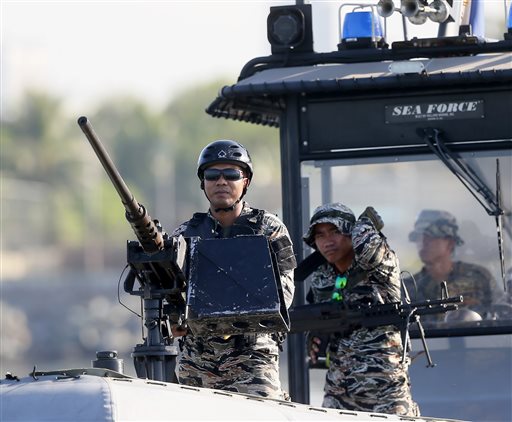
Philippine Navy Special Operations Group man their patrol boat near the venue as they implement a no-sail zone policy at the restricted zone for next week’s Apec (Asia-Pacific Economic Cooperation) Summit of Leaders Friday, Nov. 13, 2015 off Manila Bay in Manila, Philippines. The Philippine Coast Guard has announced that its personnel as well as its floating assets are providing maritime security to the head of states and delegates of the APEC Economic Leaders’ Meeting 2015 slated on Nov. 18-19 in Manila. AP
WASHINGTON—Territorial disputes will be a “central issue” when US President Barack Obama meets Asian leaders next week, the White House said on Thursday as the Pentagon disclosed that two US B-52 strategic bombers flew close to artificial islands built by China in the heavily contested South China Sea.
US National Security Adviser Susan Rice said territorial claims in the South China Sea, which have put the United States in direct dispute with China, would feature prominently during a trip to the Philippines and Malaysia, but played down hopes for a “code of conduct” to ease tensions.
“This will be a central issue of discussion both at the East Asia summit as well as at the Asean-US summit (both in Kuala Lumpur) and the other engagements that we have throughout our visit to Asia,” Rice said.
That seemed at odds with China’s insistence that the Asia-Pacific Economic Cooperation (Apec) summit in Manila next week should not discuss rising tensions.
China claims almost the whole South China Sea, an expansive claim that is challenged by Brunei, Malaysia, the Philippines, Vietnam and Taiwan.
Indonesia could wade into the dispute, threatening to take China to the International Court of Justice should talks fail to clarify that Beijing’s expansive claim does not include the Natuna islands in the Indonesian province of Riau.
China’s decision to reclaim and build artificial islands on reefs in the South China Sea recently prompted the US Navy to send in the guided missile destroyer USS Lassen to within 21 kilometers of at least one of the man-made islets in the Spratly archipelago.
‘Routine mission’
In the latest US challenge to China’s claim of sovereignty over nearly the entire sea, two US B-52 strategic bombers flew “in the area” of the Spratly islands but did not come within the 21-km zones that China claims as territory around the artificial islands it had built in the chain, Cmdr. Bill Urban, a spokesperson for the Pentagon, said on Thursday.
“The B-52s were on a routine mission in the [South China Sea],” taking off from and returning to Guam, Urban said.
Chinese ground controllers contacted the bombers but the aircraft continued their mission unabated, Urban said.
“We conduct B-52 flights in international airspace in that part of the world all the time,” Peter Cook, another Pentagon spokesperson, told a news briefing on Thursday.
In Beijing, asked about the flights, Chinese foreign ministry spokesperson Hong Lei said China respected all countries exercising freedom of navigation and overflight in the South China Sea in line with international law.
But Hong added: “We resolutely oppose any country, in the name of freedom of navigation and overflight, harming and violating international law, harming China’s sovereignty and security interests.”
Hong also said the South China Sea disputes should not be a subject for discussion at the East Asia summit.
“The East Asia summit and relevant meetings focus on regional cooperation and development,” he said. “They are not an appropriate place for discussing the South China Sea issue.”
Fresh security aid
During his trip to the Philippines for the Apec summit next week, Obama will tour a maritime facility, designed to underscore the US commitment to Philippine maritime security, amid talk of a fresh batch of US aid.
US officials said Obama would take part in what they described as “an event that showcases US maritime security assistance to the Philippines.” The officials did not elaborate.
But in September, the US Navy’s Adm. Harry Harris, head of the US Pacific Command, visited the National Coast Watch Center, a facility at Philippine Coast Guard headquarters that Washington has helped Manila build to improve its ability to monitor developments in the South China Sea.
Manila recently won the right for a United Nations arbitral tribunal in The Hague to hear the case it had brought against China over the territorial dispute. Beijing has so far ignored the proceedings.
Peaceful resolution
Rice said the US view “has always been that these disputes need to be resolved through peaceful, legal means.”
“The establishment of and implementation of a code of conduct agreed among the leaders of the region, the states of the region and, in particular, the claimants would be a positive step forward,” she added. “But I don’t expect it to be a concrete outcome of this particular visit.”
Last week an Asia-Pacific defense ministers’ meeting in Malaysia ended on a sour note as the United States and China butted heads over whether a final joint statement should mention the South China Sea.
Asked why Obama was willing to attend so many Asia summits in short order, senior Obama foreign policy aide Ben Rhodes said “when we’re not at the table, we’re on the menu.”
The issue is likely to come up again in bilateral meetings with leaders from Canada, Australia, the Philippines and Malaysia.
Refugee issue
During his visit to Malaysia, Obama will also visit a refugee center, to highlight the issue as a “global challenge.”
“There are enormous refugee flows out of Syria into Europe. There are enormous refugee flows in Africa. There are enormous refugee flows in Asia,” Rhodes said.
“Malaysia hosts a very significant population of refugees, including a significant number of Rohingya who have had to leave Burma,” he added. Reports from AFP
RELATED STORIES
Palace warns foreign activists on restrictions during Apec
PH sees Apec summit success despite absence of Putin, Widodo

